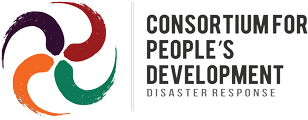The Consortium for People’s Development-Disaster Response (CPD-DR) urges the World Humanitarian Summit (WHS) to reinforce the commitment of global leaders to humanitarian principles as well as compel them to uphold human rights. The current state of humanitarian action necessitates us to demand that the WHS be true to its core commitment to go beyond providing aid and instead work towards reducing vulnerability and increasing resiliency. The summit’s commitment to reducing gaps, preventing disaster and ending conflict demands vigilance and action.
CPD-DR, having been working closely with disaster-stricken communities in the Philippines since the aftermath of super typhoon Haiyan, also urges for the weaknesses and inefficiencies of disaster response to be acknowledged in the upcoming World Humanitarian Summit.
14.1 million Filipinos suffered heavy damages during the onslaught of super typhoon Yolanda (Haiyan) in 2013. And yet, this degree of impact is only a manifestation of the long-standing vulnerability of the Philippines to typhoons heightened by the state’s incompetence in disaster response.
In April of this year, around 6000 peasants and indigenous peoples united to demand food and aid from the local government. Protesting against state neglect of the 6 communities suffering from starvation and other dire effects of El Nino (drought) from which they come from, they were answered with a brutal attack from the Philippine National Police (PNP). At a time when cries for help are answered with bullets to the head, unwarranted injuries and unconstitutional arrests; when human lives and safety are not prioritized by the state, the humanitarian sector has a lot of work to do.
It is a fact that disasters are not natural phenomenon; but vulnerabilities, when not addressed properly, incapacitate whole communities when natural occurrences strike. Adding salt to the wound is the complete and utter neglect of the people’s needs made obvious by the lack of proper mechanisms for disaster prevention and mitigation. This is a grave injustice and so is the inefficient implementation of disaster response and aid; both are crimes that have been repeatedly committed against humanity. And there are a number of ways that the gathering of global leaders, civil society organizations and the private sector could steer humanitarian action to the right direction. CPD-DR then urges the WHS to integrate the following recommendations with the summit’s specific agenda:
Localize disaster aid response
CPD-DR is calling for the localization of disaster aid response to be included in the humanitarian agenda for the 2016 World Humanitarian Summit. This would address the imbalance in the collaboration of national and local CSOs with International NGOs and United Nations Agencies; wherein the involvements of local CSOs are limited to implementation. It is the local organizations that have the capacity to design appropriate DRR mechanisms as well as effective communication with the local government. Thus, CPD-DR maintains that local organizations who have roots in the communities and have a firm grasp of each community’s cultural and environmental context should be at the forefront of disaster preparedness, response and resiliency-building.
End commercialization of emergency response
At the same time, there needs to be a clear observance of ethics in DRR especially with regard to the aid and assistance offered by the private sector. The commercialization of aid taints humanitarian response, preys on the victims’ vulnerabilities, and is plainly unethical. We call on global leaders to stand against disaster capitalism and any attempt to profit from emergency response.
Work towards long-term solutions
Addressing the root cause of vulnerability must become the priority in disaster response. CPD-DR maintains that while systemic poverty persists, it will remain a barrier towards building resiliency and aid-dependency cannot be eliminated. Financial aid must be placed on more sustainable programs beginning with funding capacity building of local organizations and community leaders. Disaster solutions that do not address poverty and does not build capacities will simply put communities in a cruel cycle of dependence and vulnerability.
